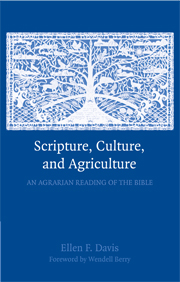Book contents
- Frontmatter
- Contents
- Foreword by Wendell Berry
- Acknowledgments
- Abbreviations
- Introduction
- 1 Rupture and Re-membering
- 2 Reading the Bible Through Agrarian Eyes
- 3 Seeing with God: Israel's Poem of Creation
- 4 Leaving Egypt Behind: Embracing the Wilderness Economy
- 5 A Wholesome Materiality: Reading Leviticus
- 6 Covenantal Economics: The Biblical Case for a Local Economy
- 7 Running on Poetry: The Agrarian Prophets
- 8 Wisdom or Sloth? The Character of Work
- 9 The Faithful City
- Postscript
- Notes
- Scripture Index
- Index
7 - Running on Poetry: The Agrarian Prophets
Published online by Cambridge University Press: 05 June 2012
- Frontmatter
- Contents
- Foreword by Wendell Berry
- Acknowledgments
- Abbreviations
- Introduction
- 1 Rupture and Re-membering
- 2 Reading the Bible Through Agrarian Eyes
- 3 Seeing with God: Israel's Poem of Creation
- 4 Leaving Egypt Behind: Embracing the Wilderness Economy
- 5 A Wholesome Materiality: Reading Leviticus
- 6 Covenantal Economics: The Biblical Case for a Local Economy
- 7 Running on Poetry: The Agrarian Prophets
- 8 Wisdom or Sloth? The Character of Work
- 9 The Faithful City
- Postscript
- Notes
- Scripture Index
- Index
Summary
CROWN AGRICULTURE IN EIGHTH-CENTURY ISRAEL
To those who speak to the many deaf ears attend.
To those who speak to one,
In poet's song and voice of bird,
Many listen; but the voice that speaks to none
By all is heard:
Sound of the wind, music of the stars, prophetic word.
(Kathleen Raine)In the widening circle of those who attend to the message of the new agrarians, it is common, almost instinctual, to characterize their message as “prophetic” witness the first chapter in this volume). Like the biblical prophets, the contemporary agrarian writers expose folly and idolatry, various forms of bad faith that are endemic to their (and our) society. Like the prophets, they express their grievances and hopes in terms that are inseparably economic, political, and religious. And further, they, like the prophets, alert those who can hear to the close or immediate threat of social collapse; they see and say that we are at a tipping point, either toward life on drastically different terms or toward death on a massive scale. Yet, if the message of the new agrarian writers may rightly be called “prophetic,” the more important fact is less widely recognized: The message of the earliest prophetic writers of the Bible was distinctly “agrarian.” The eighth-century prophets Amos and Hosea were probably the world's first agrarian writers, followed within a few decades by the Greek farmer-poet Hesiod, who resembles the biblical prophets in his complaints about corrupt judges and princes (Works and Days, lines 250–65), and also about the loss of ancestral inheritance (namely his own).
- Type
- Chapter
- Information
- Scripture, Culture, and AgricultureAn Agrarian Reading of the Bible, pp. 120 - 138Publisher: Cambridge University PressPrint publication year: 2008



